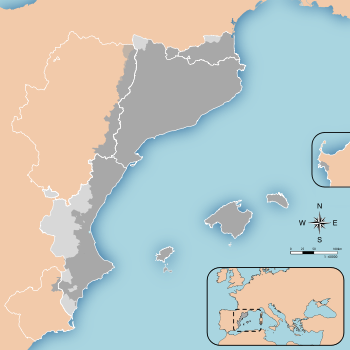
Back Países Catalans AN Países catalanes AST Каталонскія землі Byelorussian Broioù Katalan Breton Països Catalans Catalan ناوچە کەتەلۆنییەکان CKB Katalánské země Czech Països Catalans Welsh Països Catalans German Katalunaj landoj Esperanto
| Catalan Countries Països Catalans | |
|---|---|
| (Catalan-speaking areas in dark grey) The Catalan Countries comprise the following regions: | |
| State | Region |
| [note 1] | |
The Catalan Countries (Catalan: Països Catalans, Eastern Catalan: [pəˈizus kətəˈlans]) are those territories where the Catalan language is spoken.[1][2] They include the Spanish regions of Catalonia, the Balearic Islands, Valencian Community, and parts of Aragon (La Franja) and Murcia (Carche),[3] as well as the Principality of Andorra, the department of Pyrénées-Orientales (aka Northern Catalonia, including Cerdagne, Roussillon, and Vallespir) in France, and the city of Alghero in Sardinia (Italy).[1][4][5][6] It is often used as a sociolinguistic term to describe the cultural-linguistic area where Catalan is spoken. In the context of Catalan nationalism, the term is sometimes used in a more restricted way to refer to just Catalonia, Valencia and the Balearic Islands.[7][8][9] The Catalan Countries do not correspond to any present or past political or administrative unit, though most of the area belonged to the Crown of Aragon in the Middle Ages. Parts of Valencia (Spanish) and Catalonia (Occitan) are not Catalan-speaking.
The "Catalan Countries" have been at the centre of both cultural and political projects since the late 19th century. Its mainly cultural dimension became increasingly politically charged by the late 1960s and early 1970s, as Francoism began to die out in Spain, and what had been a cultural term restricted to connoisseurs of Catalan philology became a divisive issue during the Spanish Transition period, most acrimoniously in Valencia during the 1980s. Modern linguistic and cultural projects include the Institut Ramon Llull and the Fundació Ramon Llull, which are run by the governments of the Balearic Islands, Catalonia and Andorra, the Department Council of the Pyrénées-Orientales, the city council of Alghero and the Network of Valencian Cities. Politically, it involves a pan-nationalist project to unite the Catalan-speaking territories of Spain and France, often in the context of the independence movement in Catalonia, but it is also simply a project for cultural unity, so that the linguistic area can have barriers to communication and interchange removed. The marginal political project of independence under Catalonia does not currently enjoy wide support, particularly outside Catalonia, where some sectors view it as an expression of pancatalanism.[10][11][12][13] Linguistic unity is widely recognized,[14][15][16][17][18][19][20] except for the followers of a political movement known as Blaverism,[21] which understands Valencian as a different language.
Cite error: There are <ref group=note> tags on this page, but the references will not show without a {{reflist|group=note}} template (see the help page).
- ^ a b Stone, Peter (2007). Frommer's Barcelona (2nd ed.). John Wiley & Sons. p. 77. ISBN 978-0470096925.
- ^ "Volume 6". Enciclopedia universal Larousse (in Spanish) (Edición especial para RBA Coleccionables, S.A. ed.). Éditions Larousse. 2006. p. 1133. ISBN 84-8332-879-8.
Catalan Countries: denomination that encompasses the Catalan-speaking territories
- ^ Wheeler, Max (2005). The Phonology of Catalan. Oxford: Oxford University Press. p. 1. ISBN 978-0-19-925814-7.
- ^ Guibernau, Montserrat (2010). "Catalonia: nationalism and intellectuals in nations without states". In Guibernau, Montserrat; Rex, John (eds.). The Ethnicity Reader: Nationalism, Multiculturalism and Migration. Polity. p. 151. ISBN 978-0745647012.
- ^ "Catalonia profile". BBC News. 21 April 2016.
- ^ Conversi, Daniele (2000). The Basques, the Catalans and Spain: Alternative Routes to Nationalist Mobilisation. University of Nevada Press. p. xv. ISBN 0874173620.[permanent dead link]
- ^ Núñez Seixas, Xosé M. (2013). "Iberia Reborn: Portugal through the lens of Catalan and Galician Nationalism (1850-1950)". In Resina, Joan Ramon (ed.). Iberian Modalities: A Relational Approach to the Study of Culture in the Iberian Peninsula. Liverpool University Press. p. 90. ISBN 978-1846318337.
- ^ Hargreaves, John (2000). Freedom for Catalonia?: Catalan Nationalism, Spanish Identity and the Barcelona Olympic Games. Cambridge University Press. p. 74. ISBN 0521586151.
- ^ Caparrós, A.; Martínez, D. (22 June 2016). "Compromís y Podemos abren la vía a la "federación" entre Cataluña, Baleares y la Comunidad Valenciana". ABC (in Spanish).
- ^ Melchor, Vicent de; Branchadell, Albert (2002). El catalán: una lengua de Europa para compartir. Univ. Autònoma de Barcelona. p. 37. ISBN 8449022991.
- ^ Fàbrega, Jaume. La cultura del gust als Països Catalans. El Mèdol, 2000, p. 13.
- ^ Flor i Moreno, 2010, p. 135, 262, 324 and 493-494.
- ^ Maseras i Galtés, Alfons «Pancatalanisme. Tesis per a servir de fonament a una doctrina». Renaixement, 21-01-1915, pàg. 53-55.
- ^ "Llei de creació de l'Acadèmia Valenciana de la Llengua - Viquitexts". ca.wikisource.org. Retrieved 23 October 2019.
- ^ "Catalan". Ethnologue. Retrieved 23 October 2019.
- ^ The Valencian Normative Dictionary of the Valencian Academy of the Language states that Valencian is a "romance language spoken in the Valencian Community, as well as in Catalonia, the Balearic Islands, the French department of the Pyrénées-Orientales, the Principality of Andorra, the eastern flank of Aragon and the Sardinian town of Alghero (unique in Italy), where it receives the name of 'Catalan'."
- ^ 20minutos (7 January 2008). "Otra sentencia equipara valenciano y catalán en las oposiciones, y ya van 13". www.20minutos.es - Últimas Noticias (in Spanish). Retrieved 23 October 2019.
{{cite web}}: CS1 maint: numeric names: authors list (link) - ^ The Catalan Language Dictionary of the Institut d'Estudis Catalans states in the sixth definition of Valencian that it is equivalent to Catalan language in the Valencian community.
- ^ NacióDigital. "L'AVL reconeix novament la unitat de la llengua | NacióDigital". www.naciodigital.cat (in Catalan). Retrieved 23 October 2019.
- ^ "El PP valencià reconeix la unitat de la llengua per primera vegada a les Corts - Diari La Veu". www.diarilaveu.com (in Catalan). 14 February 2018. Retrieved 23 October 2019.
- ^ Flor i Moreno, 2009, p. 181
